Delve into our comprehensive guide on how to make the most of 3 days in Yellowstone National Park. From the grandeur of the Grand Canyon of the Yellowstone to the iconic geyser aptly named Old Faithful, this Yellowstone itinerary covers everything you’ll want to see on your first visit.
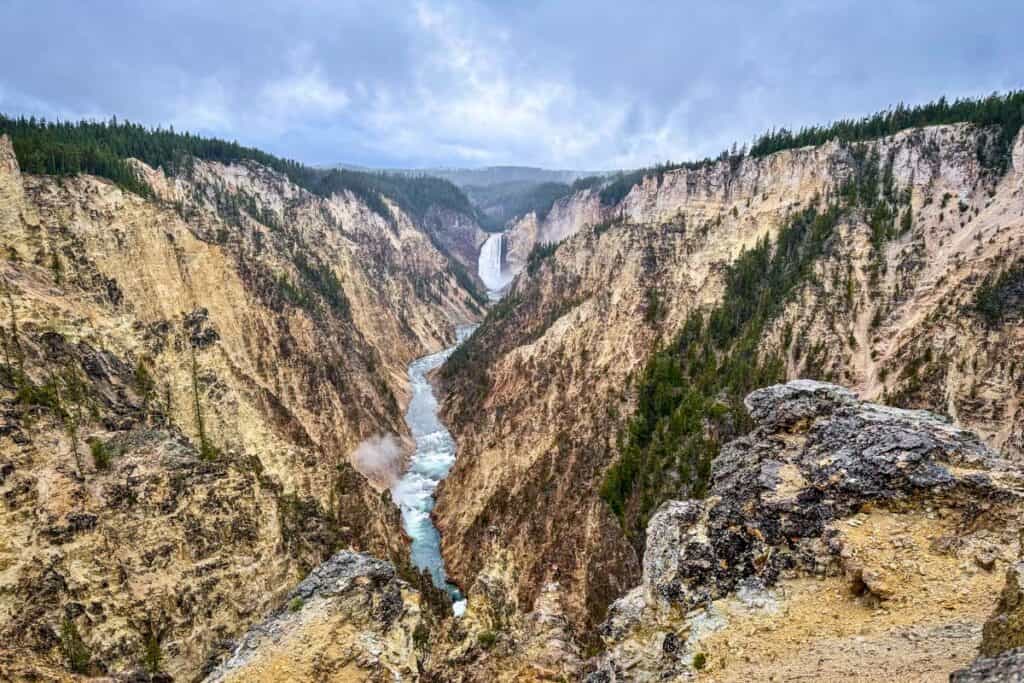
Iconic, majestic Yellowstone, the world’s first national park (and the second largest in the contiguous US, behind Death Valley), is a place like nowhere else on Earth.
Not only does the enormous park have over 10,000 geothermal features including bubbling hot springs, steaming geysers, and mud pots, it’s also home to sparkling lakes, soaring mountain peaks, the longest undammed river in the Lower 48, and wildlife galore.
A 3 days in Yellowstone itinerary gives you the perfect amount of time to experience all the must-see highlights without having to rush or feeling overwhelmed.
Yellowstone National Park Itinerary Guide
- Park overview
- Itinerary overview
- How many days do you need? Is 3 enough?
- Best time to visit Yellowstone
- How to get around
- Where to stay
- What to pack
Yellowstone National Park overview
- Open: All year round, but certain areas of the park are only accessible during warmer months
- Entrance Fee: $35/vehicle, $30/motorcycle, $20/hiking & biking or free as part of an annual America the Beautiful Pass
- Established: March 1, 1872
- Area: 2,221,766 acres
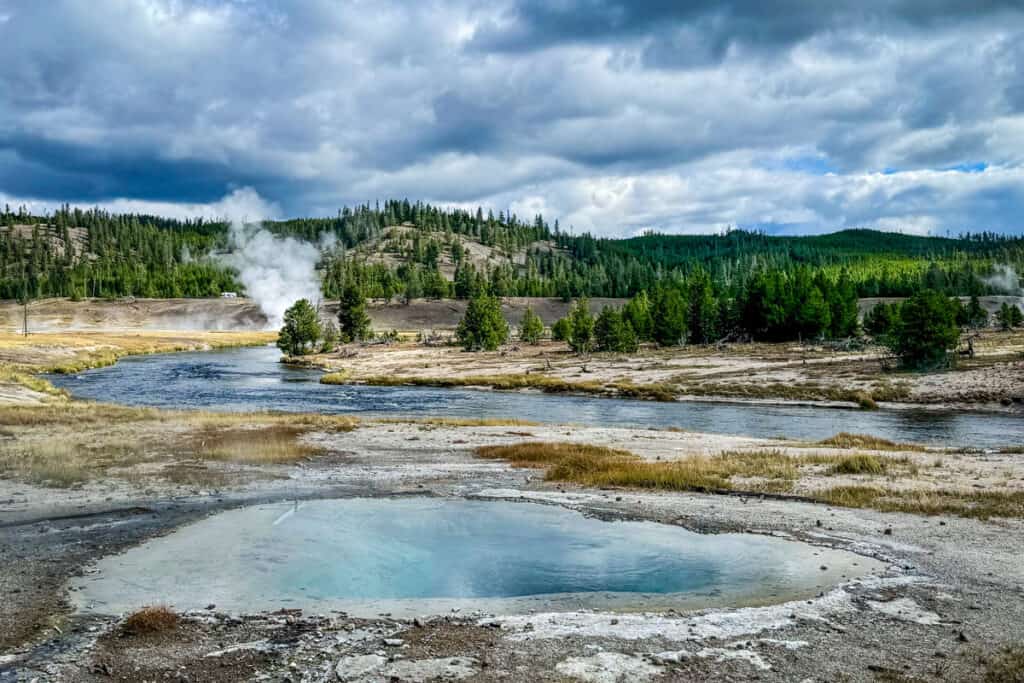
Yellowstone covers over 2.2 million acres, offering an incredulous mix of landscapes and wildlife. The diverse terrain includes everything from dense forest and deep canyons to expansive meadows and, of course, mystical-looking geyser basins.
Beyond its stunning natural beauty, Yellowstone is renowned for wildlife. Bison, elk, wolves, and bears roam freely here, offering the opportunity to spot these animals in their natural habitat.
With this 3 days in Yellowstone itinerary, you’ll have ample time to experience a bit of everything this park has to offer.
America the Beautiful annual park pass
If you’re planning to visit more than one of the US National Parks, we’d highly encourage you to look into getting an annual park pass. At $35 per vehicle upon entry, visiting the national parks in the U.S. can get expensive.

For just $80 per year, you can purchase the America the Beautiful park pass. This pass grants you free access to all of the national parks. Plus it also covers your entrance to over 2,000 natural, historical, and recreational sites across the United States.
→ Still need convincing? Check out our article: National Park Annual Pass: Is it Worthwhile? + How to Buy
3 Days in Yellowstone itinerary overview
- Day 1: Midway Geyser Basin, Grand Prismatic Spring overlook trail, Lower Geyser Basin, Biscuit Basin, Upper Geyser Basin and Old Faithful Observation Point Trail, West Thumb Geyser Basin
- Day 2: Grand Canyon of Yellowstone: Point Sublime via Artist Point Trail, Brink of the Lower Falls Trail, Drive the North Rim Drive Loop + stops, Norris Geyser Basin
- Day 3: Mammoth Hot Springs, Bunsen Peak Hike, Blacktail Plateau Drive, Lamar Valley
Planning notes:
- This 3 day itinerary for Yellowstone is meant to be done as a road trip with your own (or rented) vehicle. See below for suggestions on how to rent a vehicle if you will be flying in.
- You can swap these days around to fit your preferences and route through the park (depending on where you plan to enter, exit and stay).
- Depending on how early you start your days, and how much energy you have, you may not have the time to fit in every suggested hike in this itinerary. We kept them in so you know what’s available, but feel free to pick and choose which hikes sound best to you and fit into your preferred itinerary schedule.
Day 1: Geysers, geysers and more geysers
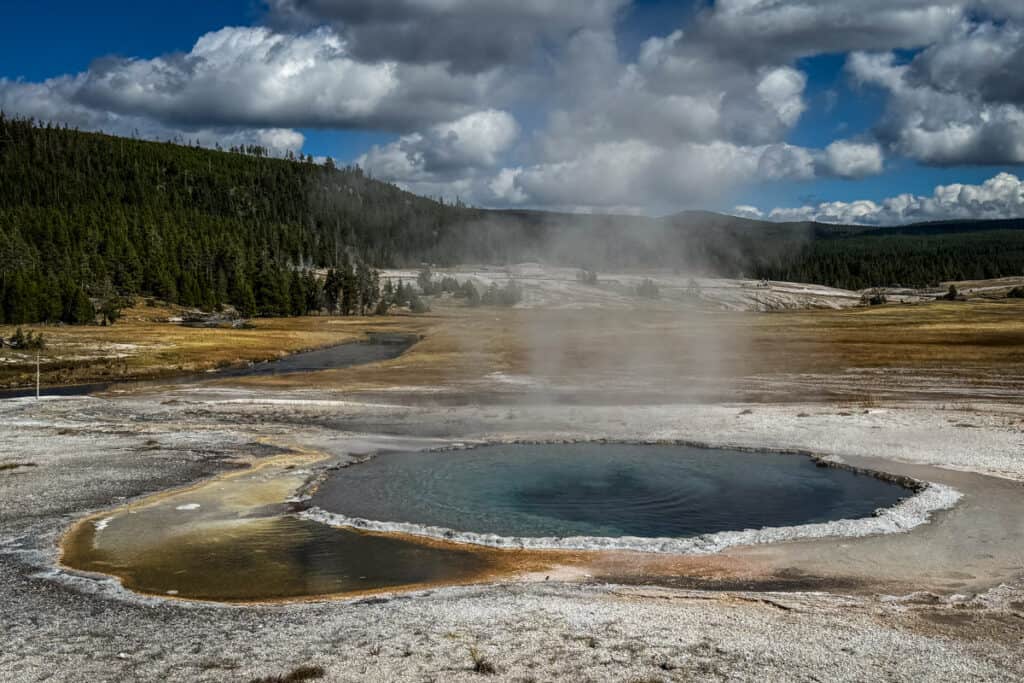
On the first day of your 3 days in Yellowstone itinerary, you’ll explore the park’s famous geysers and hot springs.
The day includes visits to iconic geothermal sites and hikes through surreal thermal basins, ending the day with a classic Old Faithful eruption—a quintessential Yellowstone experience.
Grand Prismatic Spring
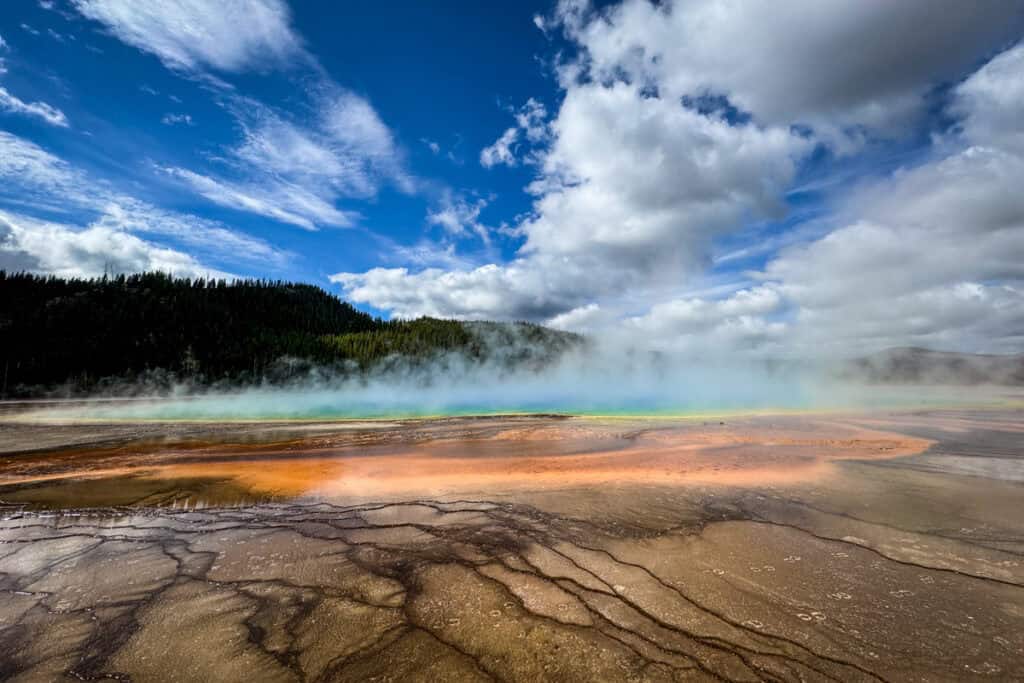
Begin your day as early as possible at Grand Prismatic Spring, one of Yellowstone’s most iconic attractions. Its vivid colors and enormous size make it a must-see, but the boardwalks tend to get busy.
I saw the first tour bus arrive by 8:15 a.m. and that was after the parking lot had already mostly filled. By 10 a.m. cars begin to form a line down the highway waiting to turn into the parking lot.
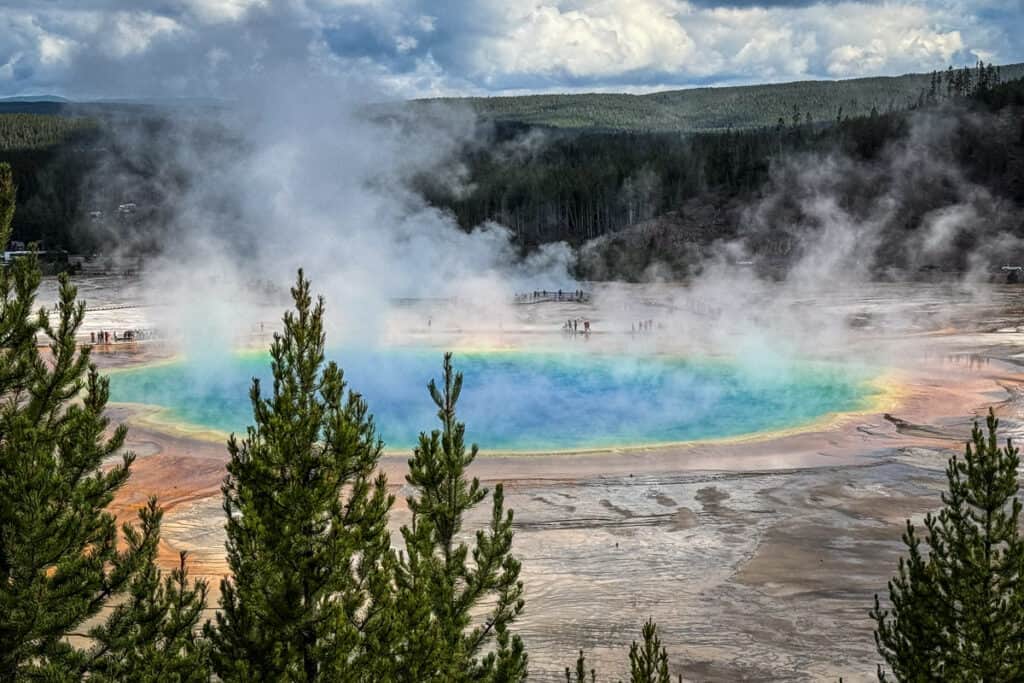
For a bird’s eye perspective, hike the short 1.5-mile trail to the Grand Prismatic Overlook, starting at the Fairy Falls Trailhead. While the viewing platform does tend to get crowded, the view is unbeatable and a must when planning your Yellowstone itinerary.
My experience: Early mornings at Grand Prismatic Spring tend to see lots of fog. When I visited, we were some of the first people in the parking lot, just after sunrise at about 7 a.m., and the fog was so thick, we could hardly see the spring. I came back later in the afternoon and while the crowds were thick (and parking was a nightmare), but I actually got to see the colors of the spring without fog.
Midway Geyser Basin
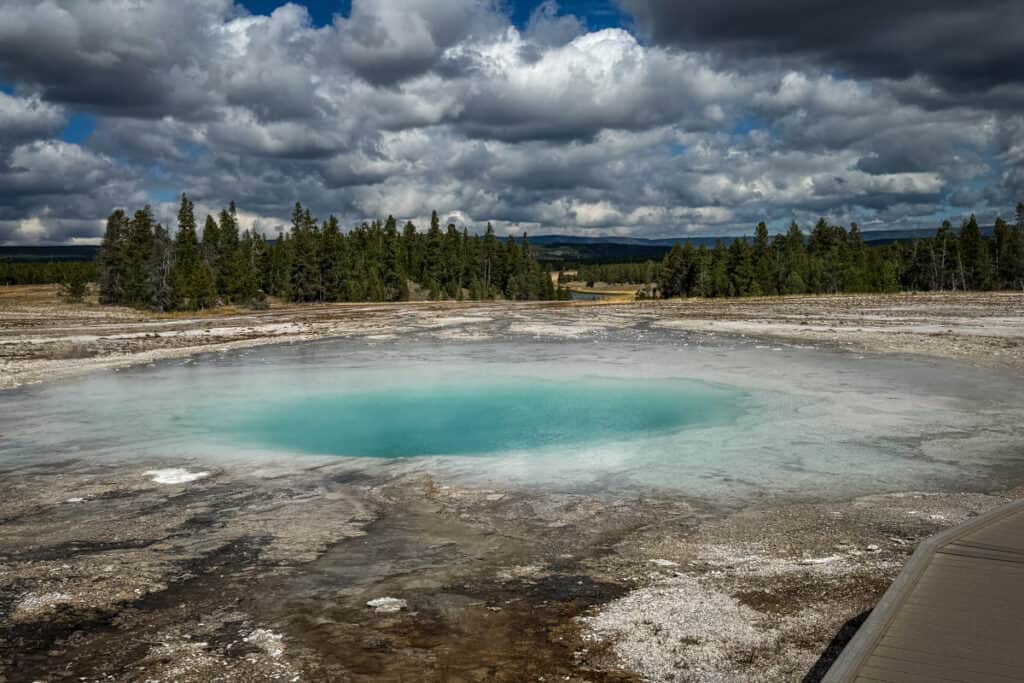
While Grand Prismatic Spring is what draws the crowds to Midway Geyser Basin, don’t leave without checking out the other impressive springs.
Excelsior Geyser is another one of the largest in Yellowstone, and is particularly impressive, discharging more than 4,000 gallons of hot water into the Firehole River every minute.
Be sure to walk the entire 0.7-mile boardwalk loop at Midway, to see both of the above and some of the other scenic turquoise pools.
Planning note: If it’s a particularly foggy morning (like it was for me), save the Midway Geyser Basin/Grand Prismatic Spring for later in the afternoon when the fog has burnt off.
Lower Geyser Basin
Make your way to Yellowstone’s largest and most diverse geyser basin, featuring everything from bubbling mudpots to colorful springs and erupting geysers.
Before setting out on a few short hikes, take a drive along Firehole Lake Drive, a 2-mile, one-way loop that passes unique cone and dome geysers. You’ll also see the impressive Great Fountain Geyser, one of the park’s most remarkable and predictable geysers, which erupts every 10 to 14 hours.
Fountain Paint Pots Trail
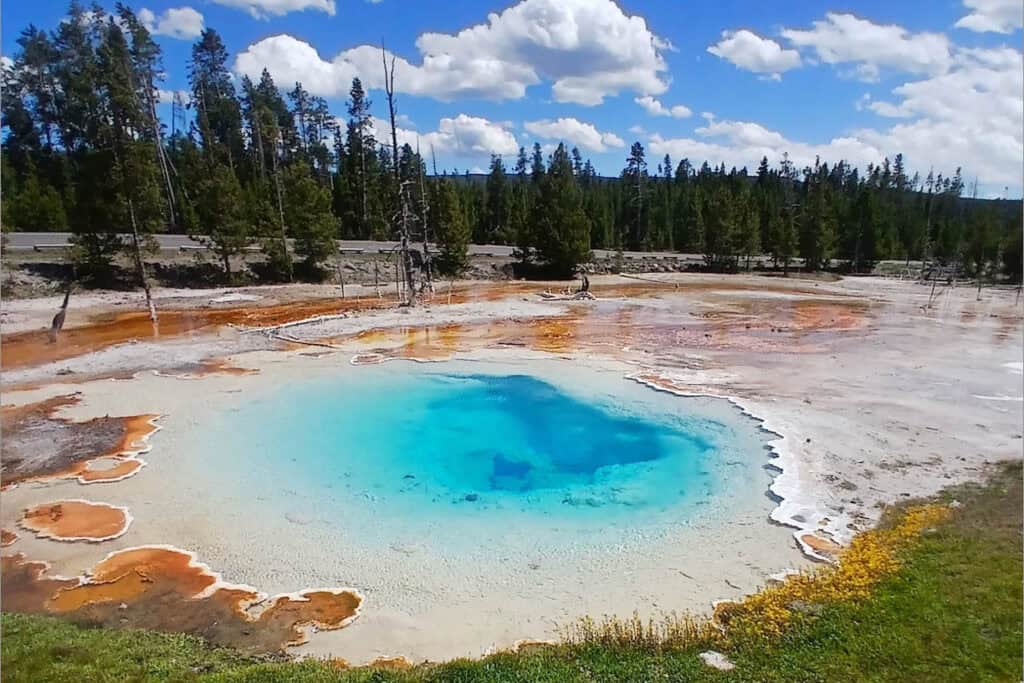
- Distance: 0.6-mile loop
- Elevation gain: 22 ft
- Difficulty rating: easy
- Trail notes on Alltrails
This brief and rewarding boardwalk trail packs a punch, offering a glimpse of all types of hydrothermal features, including mudpots, steaming fumaroles, geysers, and hot springs. While the hike is generally easy, it does include a few stairs and some steeper areas.
Biscuit Basin
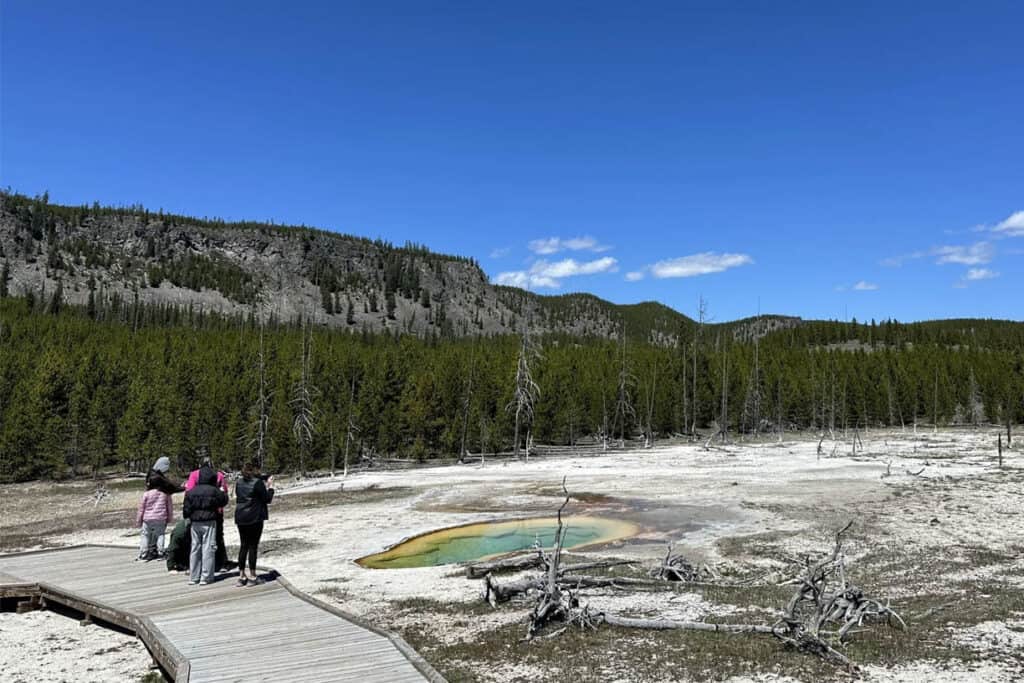
Biscuit Basin is often overlooked due to its proximity to the far more popular Old Faithful. However, this smaller, lesser-known spot is definitely worth a brief visit, offering several geysers, vibrant pools, and a fantastic hike (details below).
Mystic Falls, Fairy Creek & Little Firehole Loop
- Distance: 3.5-mile loop
- Elevation gain: 606 ft
- Difficulty rating: moderate
- Trail notes on Alltrails
This picturesque trail winds through the forest and past geysers, leading you to the Biscuit Basin Overlook and the 70-foot Mystic Falls. While most of the hike is fairly easy, there are a few steep switchbacks along the way.
If you time your visit just right, you might catch a view of Old Faithful erupting from the overlook! You can begin the hike from the Biscuit Basin parking area or take the Artemisia Trail from Old Faithful.
Upper Geyser Basin and Old Faithful
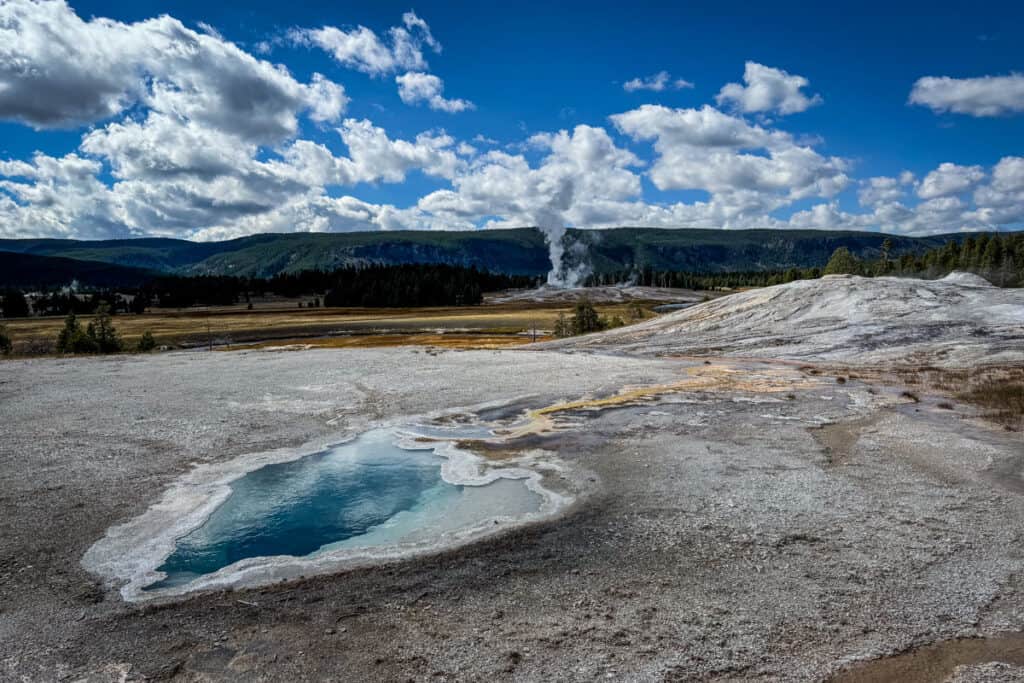
Upper Geyser Basin is best known for Old Faithful and Morning Glory Pool, but it also boasts the highest concentration of geysers on the planet, including some of the largest.
There is a fantastic boardwalk system woven throughout the geyser basin that gets you up close and personal with plenty of other geysers and scenic hot pools. One of the most notable is Castle Geyser, which was erupting for almost the entire time I was there (a good 30 minutes or so).
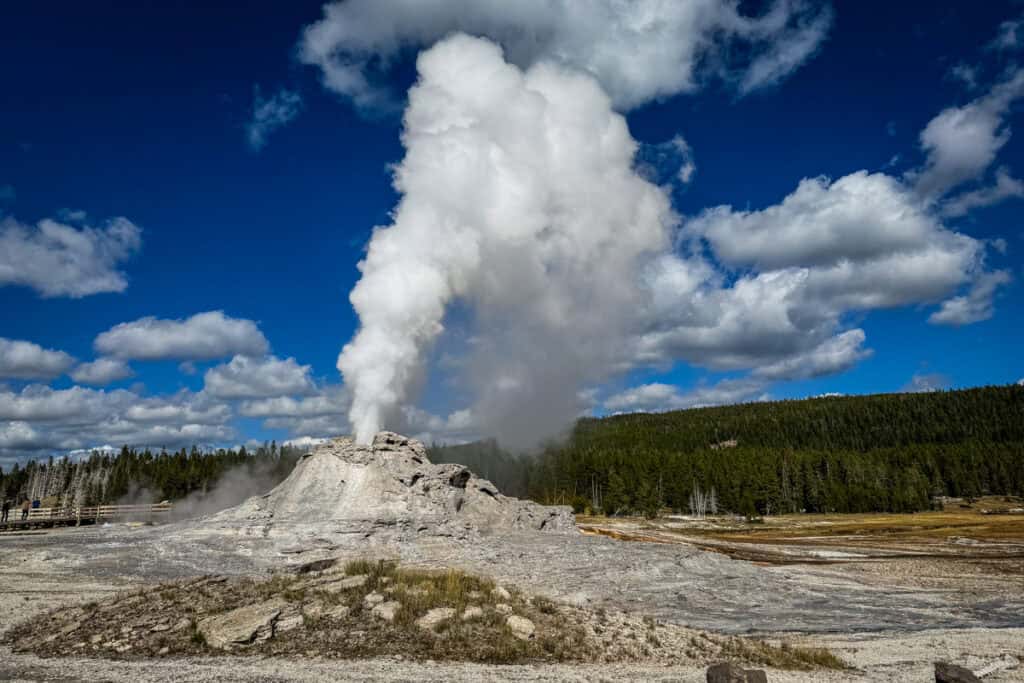
Unlike Old Faithful, most of the other geysers in this area don’t follow a predictable eruption schedule. Be sure to stop by the Old Faithful Visitor Center to get the predicted eruption times for a few of the geysers on the day of your visit.
This is also a great place to stop for lunch. I recommend the cafe (separate from the restaurant) in the Old Faithful Inn – the huckleberry ice cream is a must!
Old Faithful
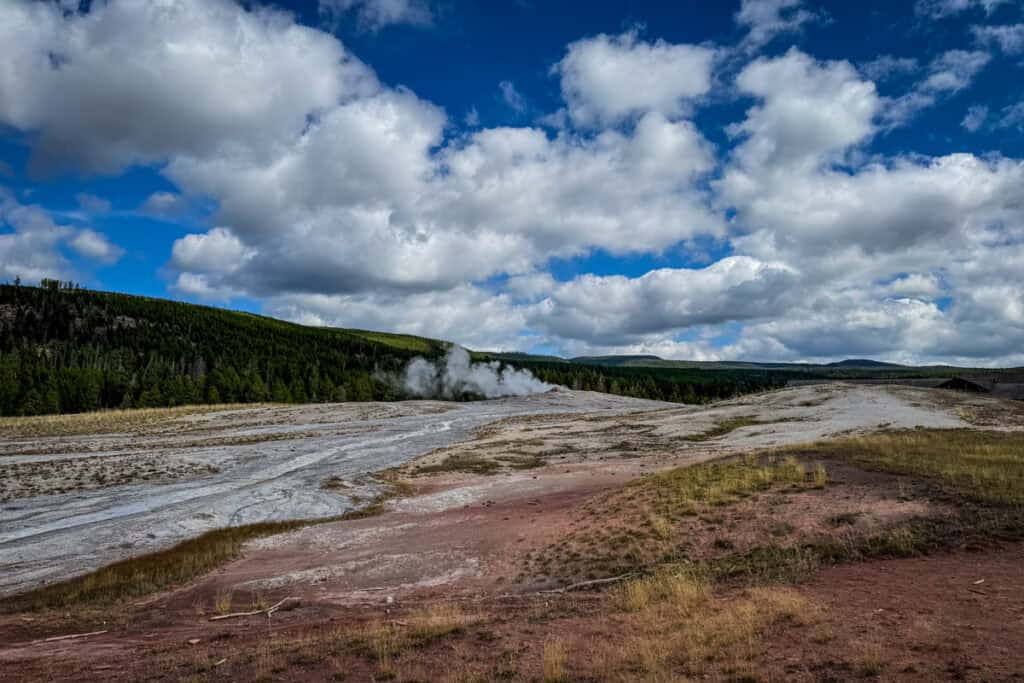
Perhaps Yellowstone’s most famous landmark, the aptly named geyser lives up to its name with predictable eruptions lasting 1 to 5 minutes, up to 20 times a day.
Watching Old Faithful erupt is a must-do on your Yellowstone itinerary. I’d recommend watching the eruption from the viewing area (even with crowds, there’s plenty of space to see – just walk around back beyond the seating areas) as it will be cooler to see from eye level.
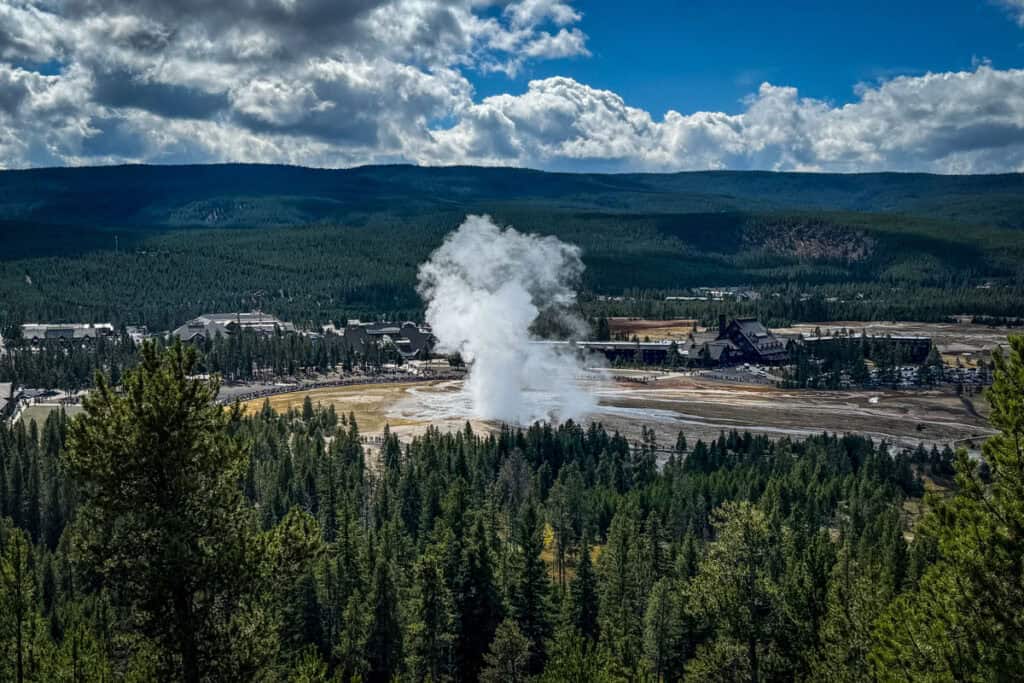
Afterwards, hike the short trail up to Old Faithful Observation Point. This easy 1.6-mile out and back trail offers a bird’s eye view of the entire Upper Geyser Basin with Old Faithful as the centerpiece.
My experience: Watching the eruption from the Observation Point was a bit anticlimactic. The views are certainly worth the hike, but with all the steam produced by the eruption, it was hard to see anything more from so far away. Viewing the eruption from the ground will give you a better sense of the volume of water pumped into the air during an Old Faithful eruption.
West Thumb Geyser Basin Trail
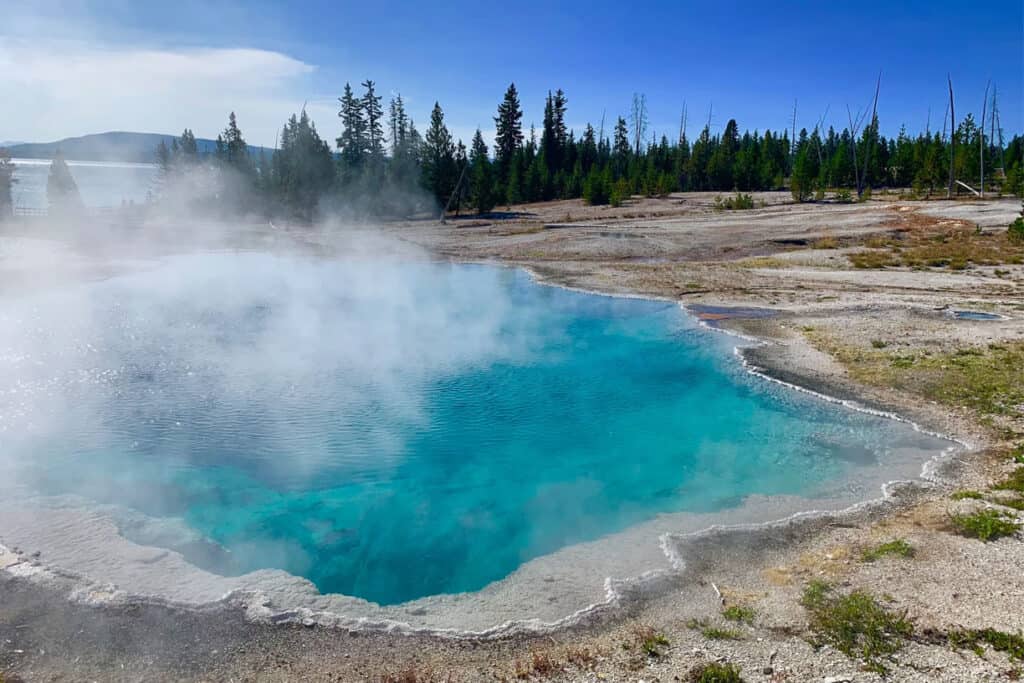
- Distance: 1-mile loop
- Elevation gain: 62 ft
- Difficulty rating: easy
- Trail notes on Alltrails
West Thumb is a peaceful and often overlooked area which lies along the shores of Yellowstone Lake. While it lacks erupting geysers, it offers plenty of beautiful geothermal features—without the crowds!
The simple boardwalk trail splits the basin into two sections, forming a double loop around several striking pools. Highlights include Abyss Pool, Collapsing Pool, Fishing Cone, and Blue Funnel Spring.
Day 2: Grand Canyon of the Yellowstone
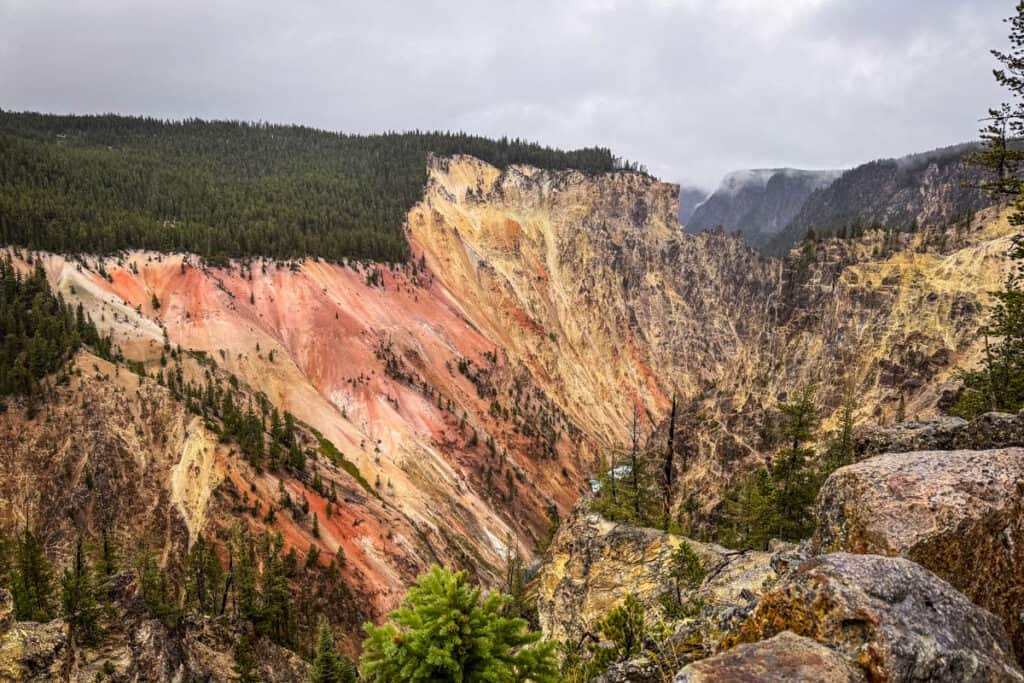
On day 2 of your 3 day itinerary for Yellowstone you’ll discover the stunning Grand Canyon of the Yellowstone and one of the park’s most distinctive geothermal areas.
While the Grand Canyon area is a central attraction, there’s plenty to experience with various viewpoints and trails along both the north and south rims.
You’ll hike along the canyon rim and drive to several breathtaking viewpoints before wrapping up the day exploring Norris Geyser Basin, which is one of the most active areas in Yellowstone.
Point Sublime via Artist Point Trail

- Distance: 2.7 miles, out-and-back
- Elevation gain: 341 ft
- Difficulty rating: moderate
- Trail notes on Alltrails
Start your day with this easy going hike which leads you from Artist Point to Point Sublime, two of the park’s most famous overlooks.
Plan for about 1 hour and 15 minutes to trek along the southern rim of the canyon, where you’ll enjoy views that rival—even exceed—those from the official viewpoints.
While Sublime Point itself might feel a bit underwhelming, the stunning scenery along the route more than makes up for it. Despite the large, crowded parking lot, you’ll likely escape the throngs once you hit the trail, as many visitors only stop to enjoy the views from Artist Point before departing.
The trailhead for Artist Point is located at the east end of the parking lot, and you’ll find vault toilets at the opposite end.
Tip: Even if you choose not to do the hike, Artists Point is an easy walk from the parking lot and a must-add to your Yellowstone itinerary.
After your hike, on your way back on South Rim Drive, be sure to stop at Upper Falls View, also known as Canyon Overlook. The overlook is just a short stroll from the parking area.
Drive the North Rim Drive Loop
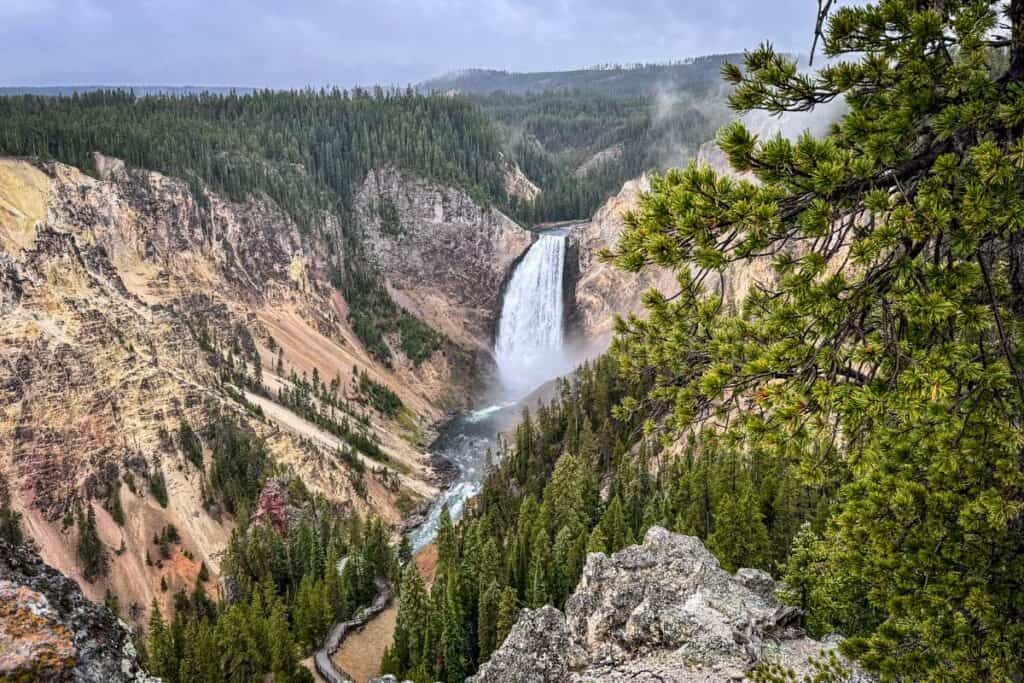
Make your way across to the North Rim of the canyon to experience the stunning views of Lower Falls from various viewpoints. We recommend driving the one-way North Rim Drive and stopping at all the viewpoints, including Brink of the Lower Falls (a hike we highly recommend!), Lookout Point, Red Rock Point (another short but steep boardwalk trail) and Inspiration Point.
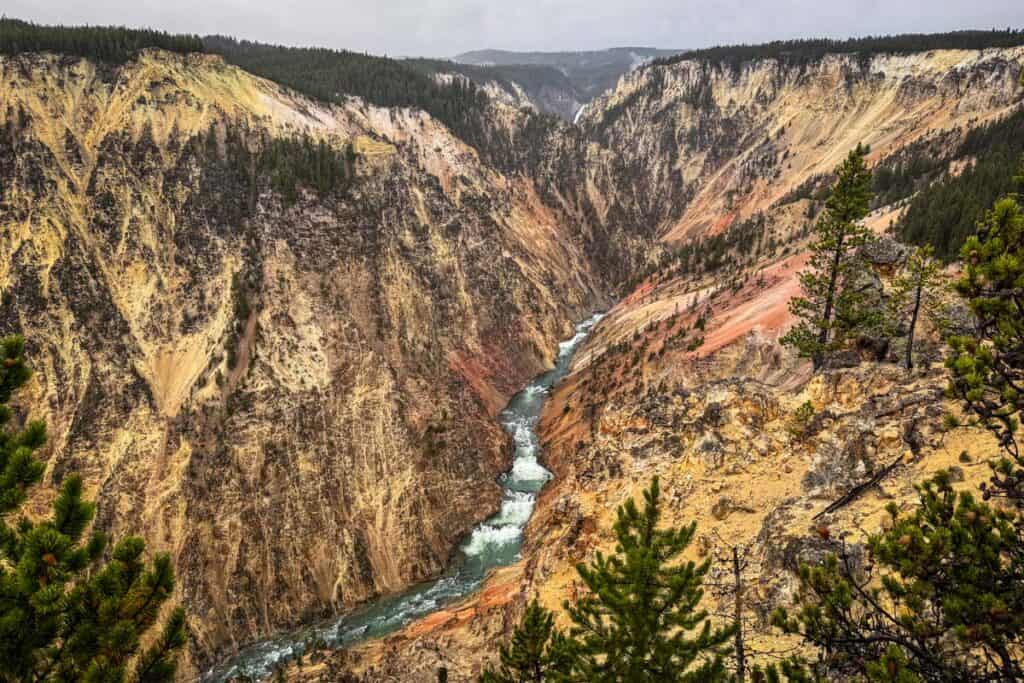
You can also choose to hike part or all of the North Rim Trail, which links the lookouts through short, steep spur trails. If you have a tighter itinerary for Yellowstone National Park, driving to the viewpoints will save you time and maximize your experience.
Brink of the Lower Falls Trail
- Distance: 0.7 miles out-and-back
- Elevation gain: 265 ft
- Difficulty rating: Easy
- Trail notes on Alltrails
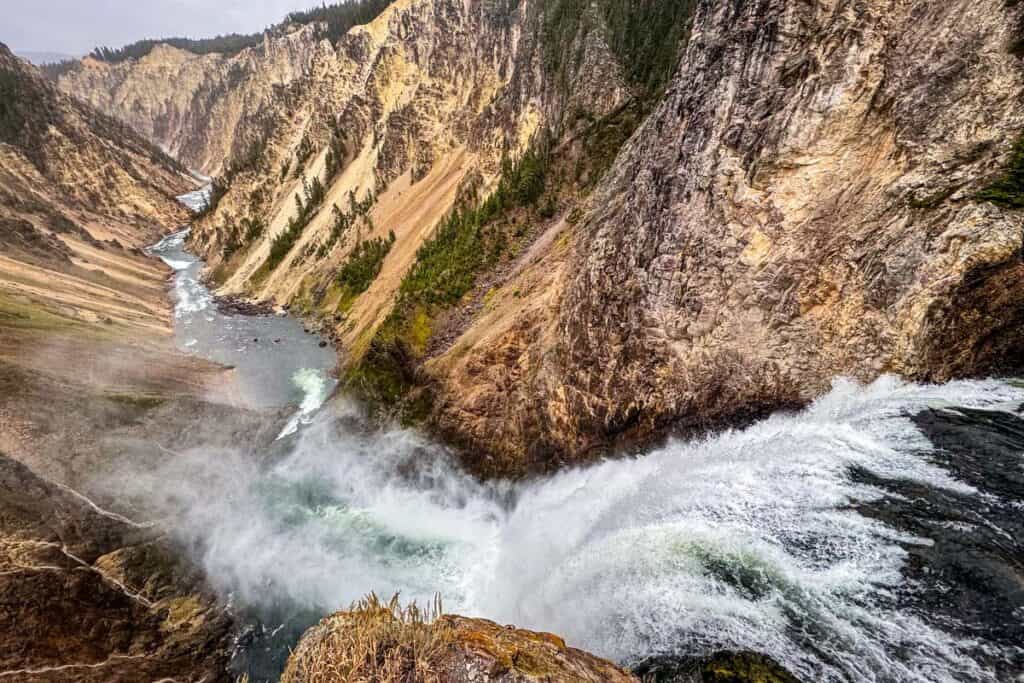
If you’re planning to do just one hike on the North Rim during your 3 day Yellowstone itinerary, make it this one. This was hands-down the coolest hike I did in the park with the most bang for your buck.
Start by parking in the North Rim lot and set aside about 45 minutes for this brief yet steep hike.
The paved trail descends directly into the canyon, leading to two viewing platforms. One platform offers the sensation of standing right at the edge (one might say “brink” – see what I did there!?) of the falls, while the other is located just above it.
Norris Geyser Basin
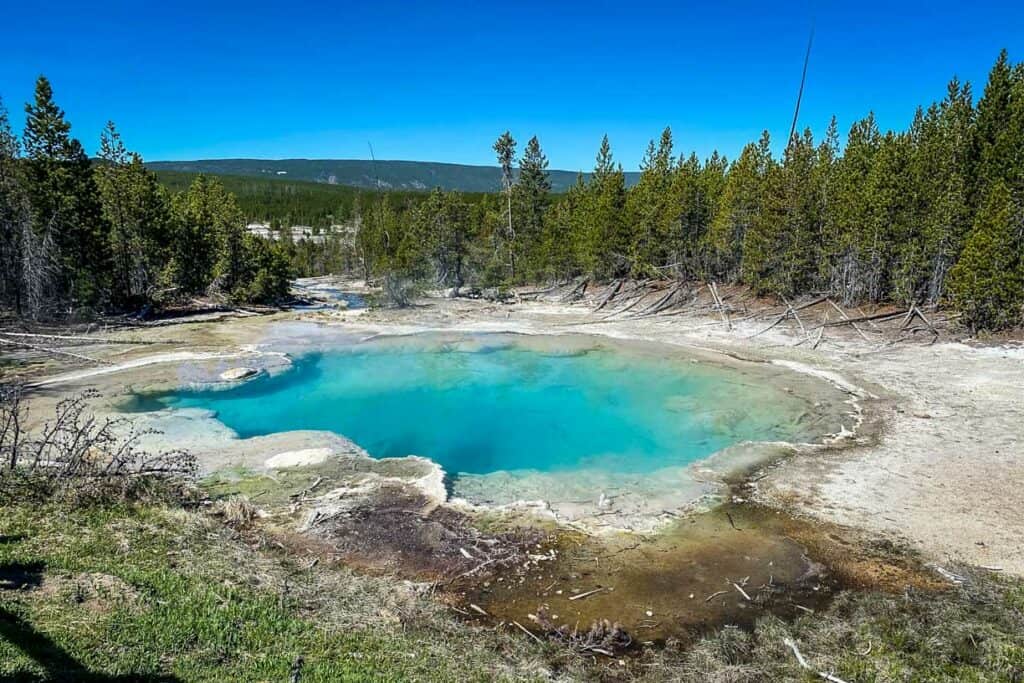
After taking in the stunning views of the Grand Canyon of the Yellowstone, drive approximately 25 minutes to Norris Geyser Basin. This area is the park’s oldest, hottest, and most “dynamic” geothermal zone, with features that can change from day to day.
Norris Geyser Basin consists of two main sections: Back Basin and Porcelain Basin.
Back Basin is larger, featuring a 1.9-mile trail that winds through and is renowned for being home to Steamboat Geyser, the tallest geyser in the world.
Although Steamboat is frequently active, its full eruptions are unpredictable. When it does erupt, it can shoot water 300 to 400 feet into the air, more than double the height of Old Faithful’s eruptions!
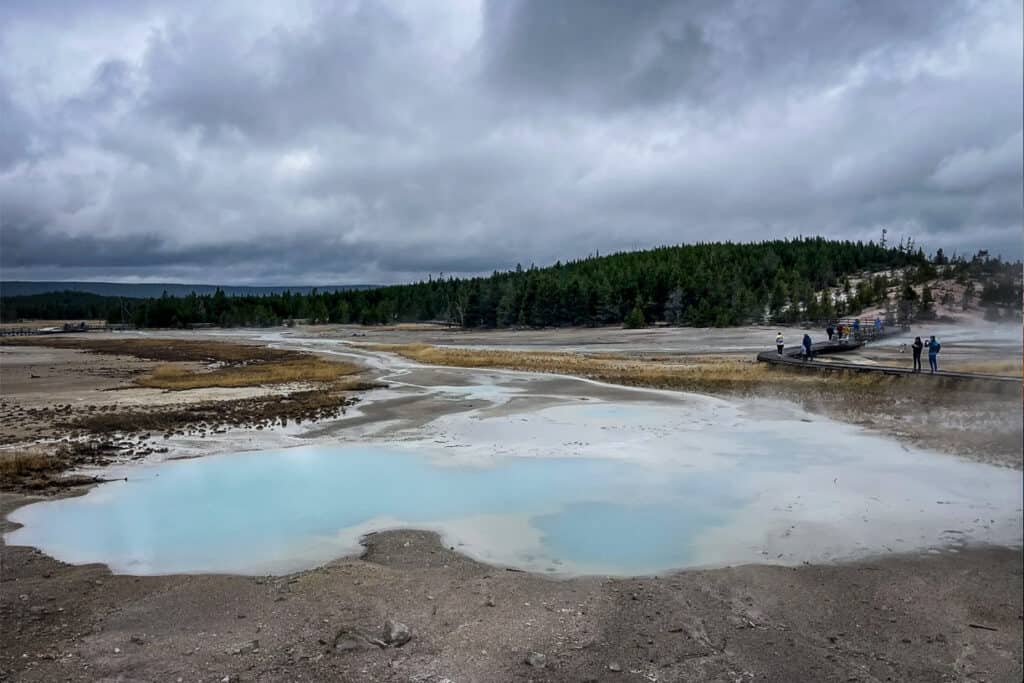
On the other hand, the smaller Porcelain Basin offers a lot to see as well. A 1-mile trail leads you through a desolate landscape, showcasing numerous colorful thermal pools and steaming geysers.
Day 3: Mammoth Hot Springs and Lamar Valley
Your 3 day itinerary for Yellowstone wraps up in the park’s northern region, featuring the surreal Mammoth Hot Springs and Lamar Valley, which is renowned for wildlife viewing.
Mammoth Hot Springs
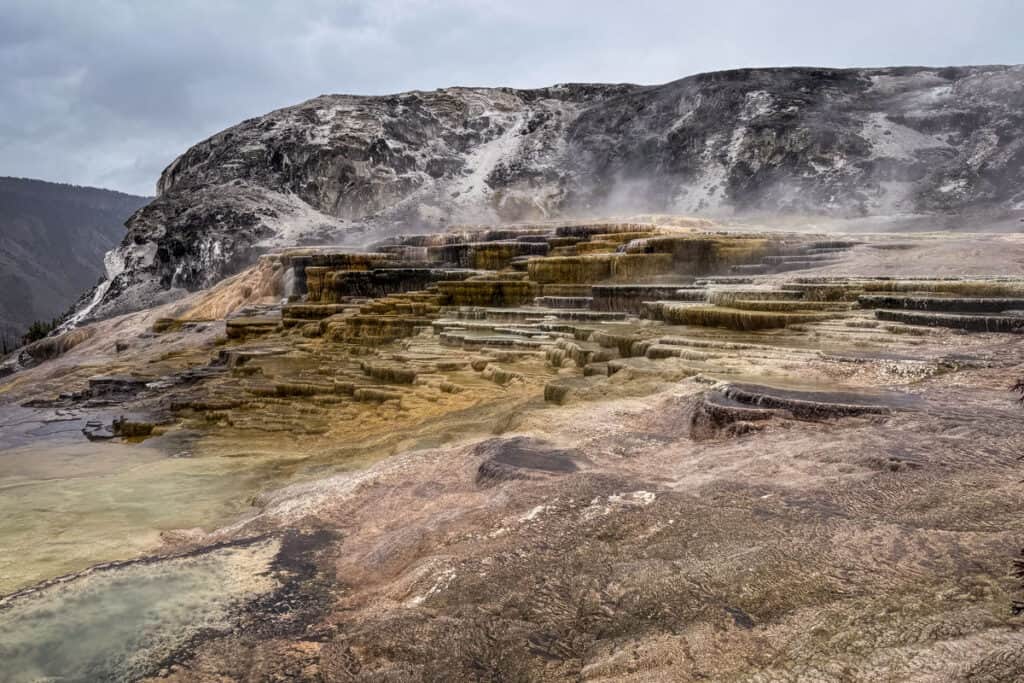
This is an excellent spot to kick off your final day in Yellowstone, especially if you can catch the sunrise at Canary Spring. The viewing platform is situated at the highest point of the terraces, offering a fantastic perspective.
The famous travertine terraces are highly dynamic, with their colors and overall appearance shifting continuously. They typically exhibit a milky, opalescent white, but you might also notice vibrant neons and soft pastels. You can visit multiple times and have a completely different experience each time!
Mammoth Terraces Trail
- Distance: 2.5 miles out-and-back
- Elevation gain: 383 feet elevation gain
- Difficulty rating: Easy
- Trail notes on Alltrails
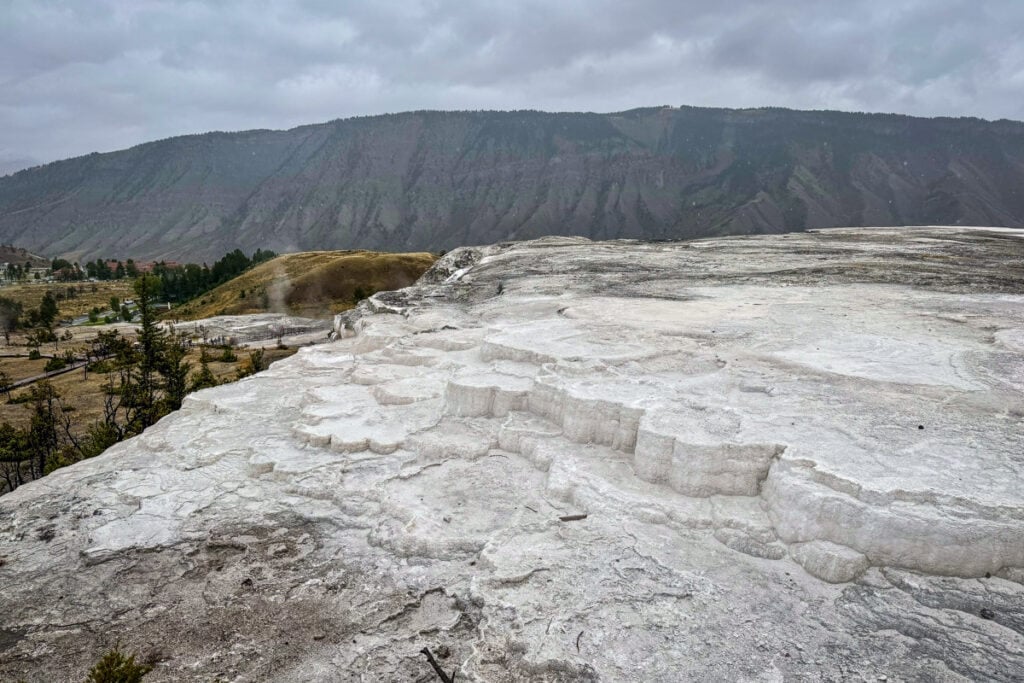
After soaking in the peaceful early morning views, embark on this brief, relatively easy hike (allow around 1.5 hours). The trail consists of a combination of boardwalks and paved paths, though it also features stairs so unfortunately it is not entirely accessible.
You’ll encounter over a dozen springs along the way, with notable highlights including Opal Terrace, Palette Spring, Liberty Cap, and Canary Spring.
Quick Stop: Undine Falls
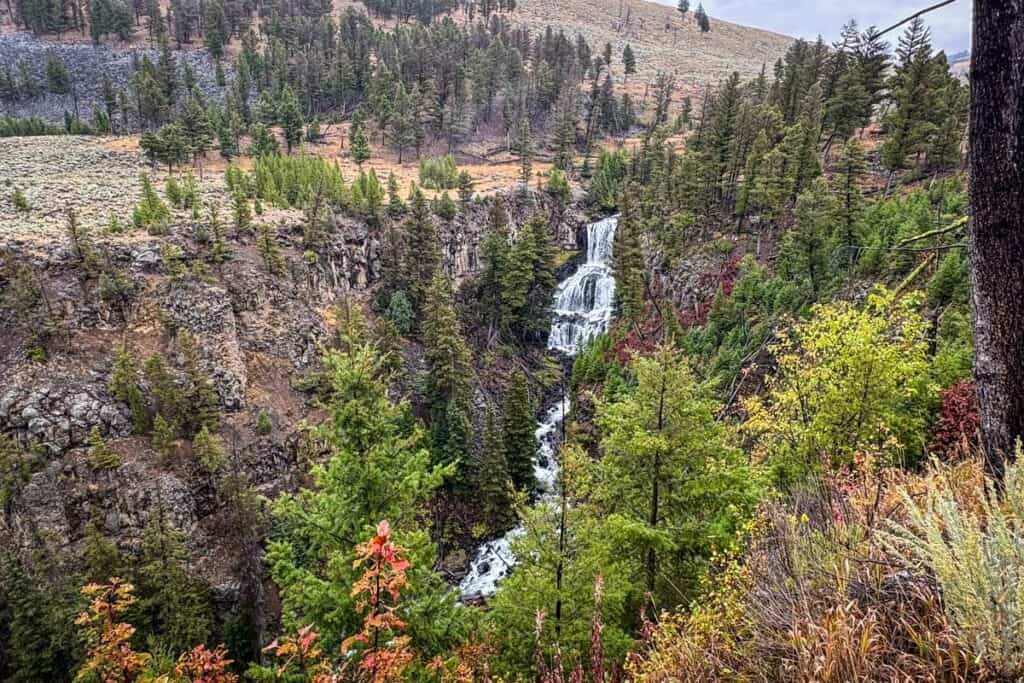
Just off Grand Loop Road after leaving Mammoth Hot Springs, there are a few cool viewpoints you may want to stop at.
Undine Falls is a stunner that lies just beyond the parking lot (no walk required!) and will certainly leave your camera lens happy.
Another is Wraith Falls, which requires a short 0.9-mile return hike to reach, but is a well-trodden path with lots of beautiful views.
Pleasant Valley via Blacktail Plateau Drive
This 6-mile one-way drive takes you along a gravel road that winds through lush forests and open meadows, providing excellent opportunities for wildlife viewing—keep an eye out for bison, elk, and deer.
The road is an offshoot of the Grand Loop Road between Mammoth and Tower Junction that is only open during warmer months. There are several pullouts along the way where you can stop to take in the breathtaking views and capture memorable photos.
The drive is accessible from this point off Grand Loop Road, and it’s recommended to allow about an hour for a leisurely exploration. Just be aware that the road can be bumpy, so a vehicle with good clearance is advisable.
My experience: Without any explanation, the road was closed when we drove into the entrance and we unfortunately did not get to experience this drive. If that is the case, you’ll have to stick to Grand Loop Road and make your way towards Lamar Valley.
Lamar Valley
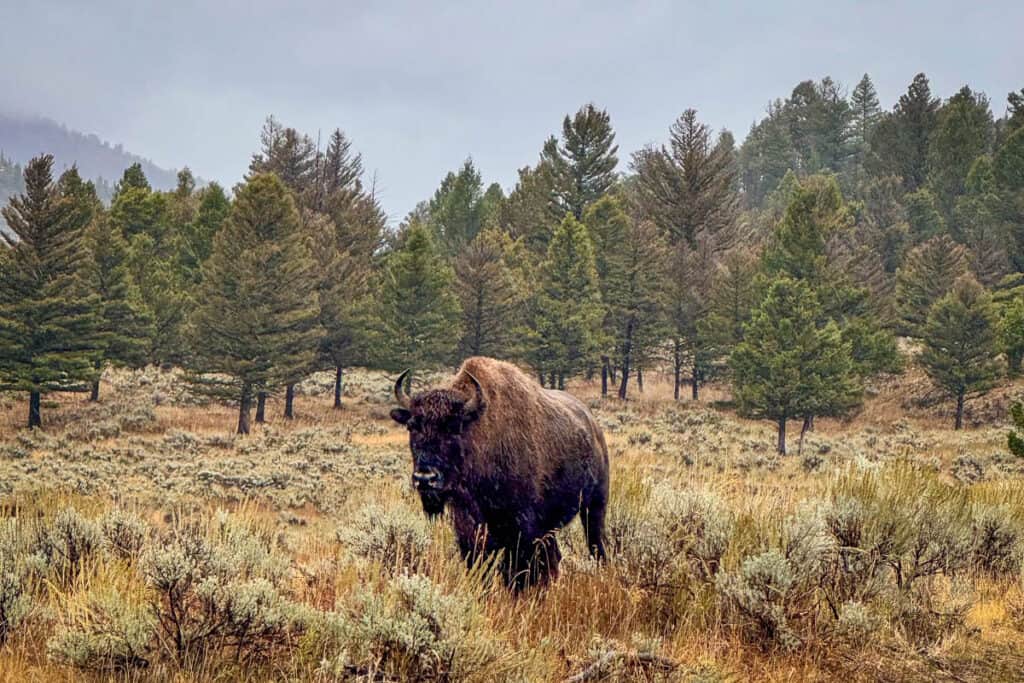
Some visitors overlook Lamar Valley on their Yellowstone itinerary, but it’s an essential stop for wildlife lovers.
Photographers come here throughout the year, hoping to catch glimpses of bison, elk, bears, antelope, and wolves. For the best chances of spotting wildlife, try to arrive during the golden hour.
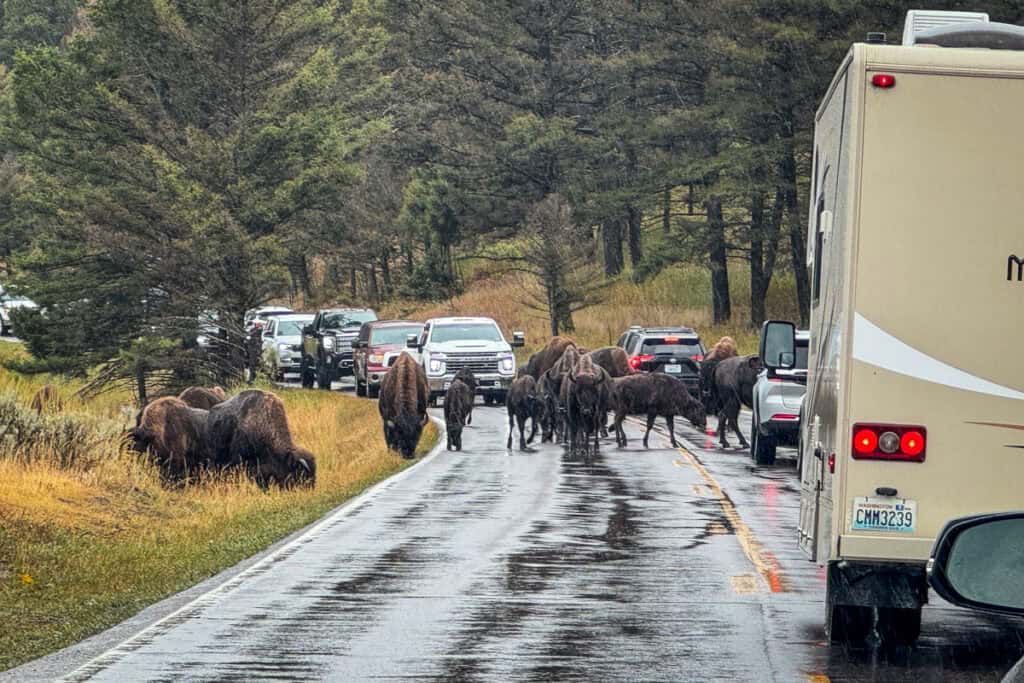
A drive through Lamar Valley takes you through prime wildlife habitat, with a high likelihood of encountering a bison “traffic jam”!
You can watch from your vehicle (keep an eye out for photographers with tripods and spotting scopes!), or if you prefer a more active experience, take the Lamar Valley Trail. The trail spans seven miles round-trip, but since there’s no designated summit, you can turn back whenever you choose.
Bunsen Peak Hike
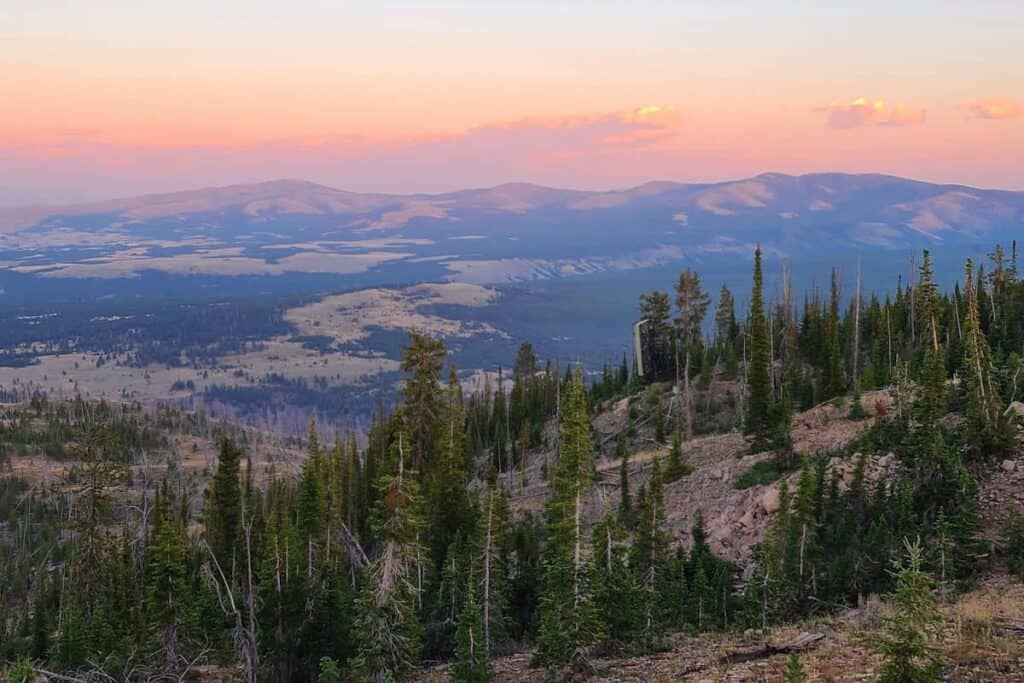
- Distance: 4.4 miles, out-and-back
- Elevation gain: 1,282 feet
- Difficulty rating: Moderate
- Trail notes on Alltrails
Double back towards Mammoth Hot Springs to conclude your day with a sunset hike up Bunsen Peak.
The trail ascends steadily all the way to the summit, and you’ll encounter some loose rocks near the top, but it’s still feasible for casual hikers. The breathtaking panoramic views from the summit overlooking the park make the effort worthwhile!
You can find the trailhead at the Glen Creek Trailhead parking lot, located about 5 miles south of Mammoth Hot Springs, just beyond the Golden Gate Bridge Park. Plan for 2 to 4 hours for the hike, depending on your pace.
Keep in mind that this hike is in bear country, so carry bear spray with you and be “bear aware” – especially if attempting to hike down after dark!
How much time do I need in Yellowstone National Park?
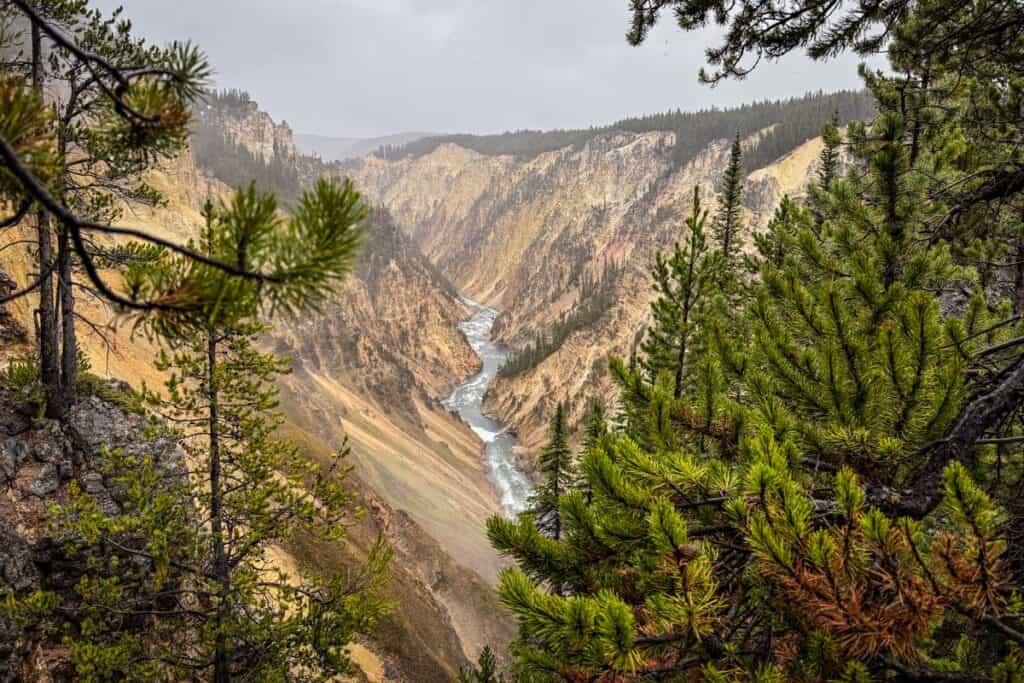
Three days is an ideal amount of time to explore Yellowstone, especially for first-time visitors. This allows a solid balance between seeing highlights like Old Faithful and Grand Prismatic Spring, and having enough time to visit less crowded areas without feeling rushed.
Due to the park’s sheer size, a shorter Yellowstone itinerary means you’d likely have to skip seeing entire areas or major attractions.
Best time to visit Yellowstone National Park
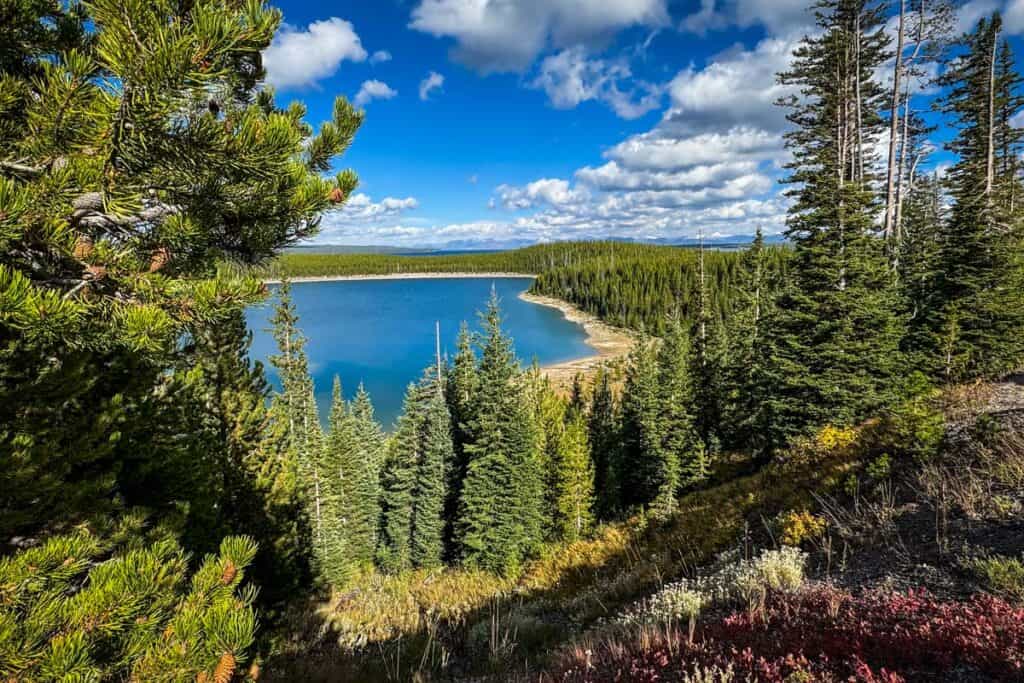
While personal preferences and time constraints factor in, our personal pick for the best time to visit this uber-popular park is fall, once schools are back in session.
Summer is peak season and best for hiking. However, by mid-September into early October, summer crowds thin out, making it easier to enjoy the highlights without fighting crowds or feeling rushed. The weather is also cooler but still pleasant, and changing foliage adds even more beauty.
Another bonus: wildlife is generally more active during this time of year.
If you’re planning a 3 day itinerary for Yellowstone outside of summer or early fall, keep in mind that much of the park is inaccessible for about half the year.
The North Entrance in Gardiner is the only entrance open year-round, while the other four, and most park roads, close for the season in October or November, reopening between mid-April and late May.
You can still visit in the winter or spring, but your itinerary and activities will look very different. Winter activities such as snowshoeing, cross-country skiing, and guided snowmobile tours are all part of the experience and wildlife viewing against the snowy backdrop is exceptional.
Psst! Did you know Yellowstone is one of the best national parks to visit in winter?
Transportation for this Yellowstone itinerary
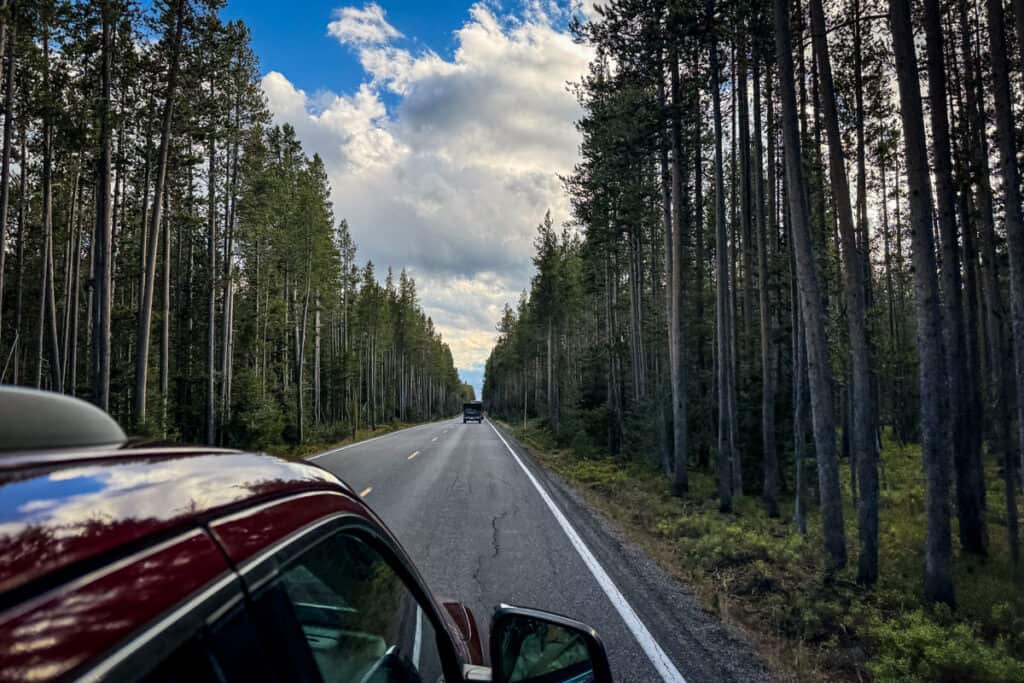
This 3 day itinerary for Yellowstone is meant to be followed by vehicle as the park is vast and could not be covered in just 3 days any other way.
If you don’t have your own vehicle, you can plan to rent a car (or campervan!) at the airport you fly into.
What’s the best rental car company? The one that gives you the best deal!
For road trips in the US, we’ve personally had good experiences with DiscoveryCars.com and Booking.com (formerly RentalCars.com). We’ve booked through them several times and have found some really great deals.
Search & Compare Rental Car Prices
- Discover Cars: We personally use this aggregate site to compare rental car prices from all the big name companies and get the best price possible.
- Booking.com: We’ve had good experiences finding rental cars with this site (formerly RentalCars.com) in the past.
Wanna give vanlife a try while visiting Yellowstone?
It’s no secret we’re obsessed with #vanlife. However, if you don’t have the time (or interest!) in building your own conversion but you still want to give vanlife a test drive, we’ve got options for you…
Check out our list of top companies for USA Campervan Rentals from budget to bougie, we’ve even included some exclusive discounts for our readers.
One company we’d recommend looking into is Escape Campervans. They have 12 different locations across North America and come fully loaded with all the gear you need for an epic road trip. Plus, their rates are fair and affordable.
BONUS: We’ve partnered with them to give you a 10% off discount when you use our link!
Where to stay at Yellowstone National Park
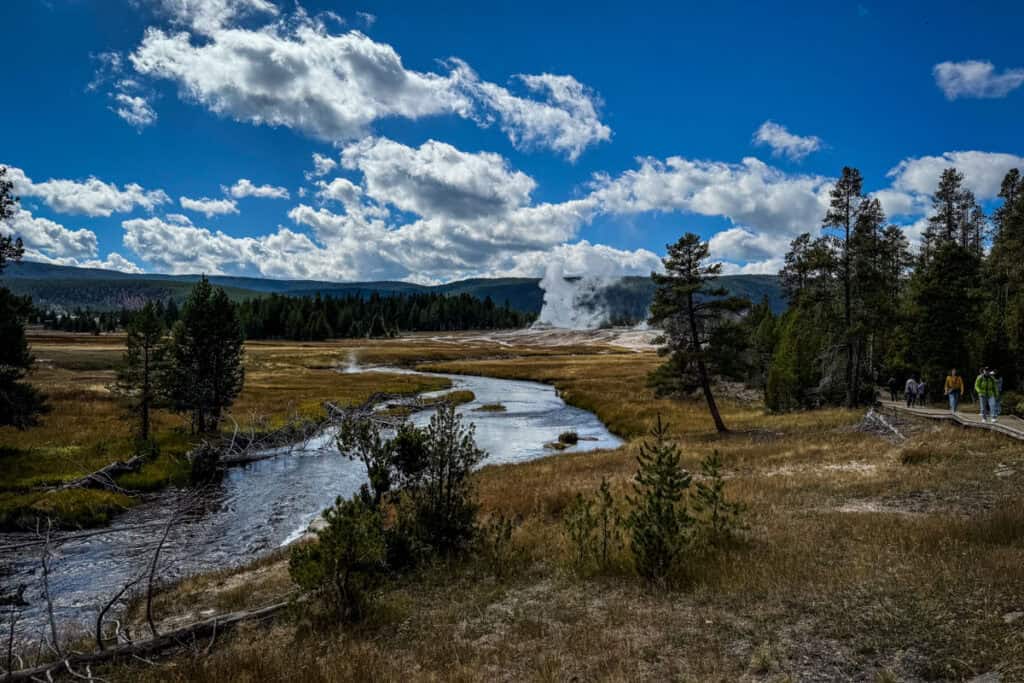
Within Yellowstone National Park, you have various accommodation options to choose from. There are 9 in-park lodges and cabins available to book.
Plus Yellowstone has 12 campgrounds. Nearly all accommodate tents and RVs, though they vary significantly in amenities.
Advance reservations are required for all lodges and campgrounds.
For more information on Yellowstone Camping, reference the NPS site for the latest information on site availability and pricing. If sites are all booked up, try using the popular camping app The Dyrt to find additional camping sites near Yellowstone National Park.
If you want to stay outside the park, the closest accommodation options to Yellowstone will be in Gardiner, Montana (North Park Entrance) or West Yellowstone, Montana (West Park Entrance).
What to pack for your Yellowstone National Park itinerary
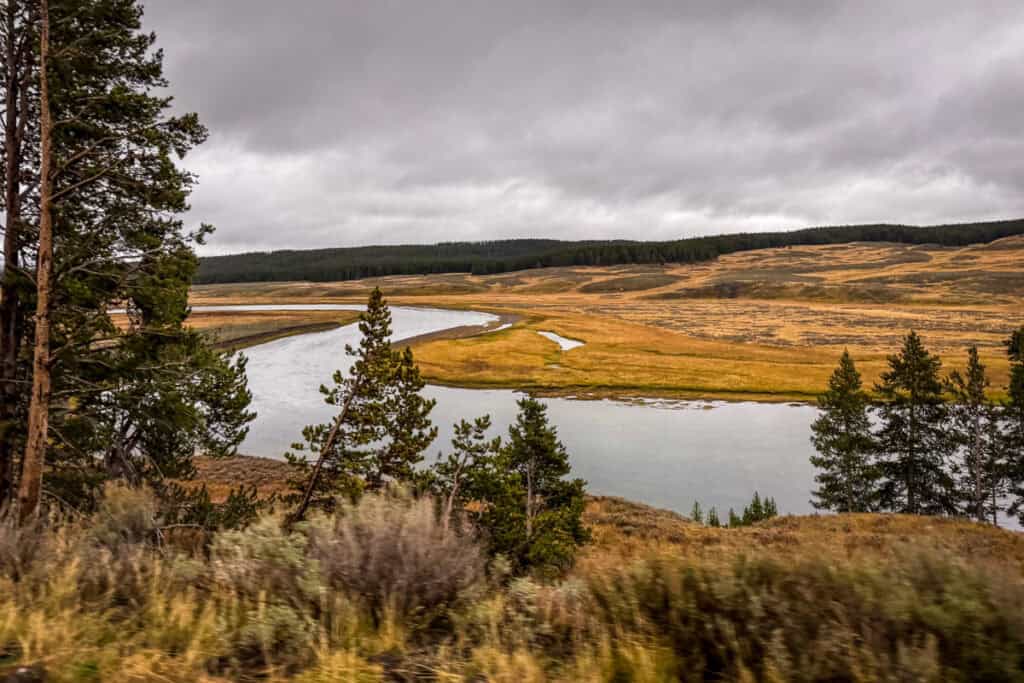
There are a few things that you won’t want to forget when packing for your trip to Yellowstone National Park.
- National Parks Annual Pass
- Navigation: we recommend using Alltrails+ to download the offline trail map
- Get your first week of using Alltrails+ for FREE when you sign up using our link!
- Hiking daypack
- Refillable water bottle
- Bug repellant
- Sun protection: sunscreen, hat, sun glasses
- Headlamp
- Camera/tripod (this one’s our favorite for hiking)
- Hiking layers (here is a great resource if you’re wondering what to wear hiking)
- Rain jacket
- Comfortable hiking boots or shoes
- Hiking poles (optional)
- Bear spray (just in case)
- Plenty of snacks: check out our favorite hiking snacks here!
- Camping gear – if you are staying at one of the park’s campsites
You may also like…
- Best Things to Do in Yellowstone National Park (Ultimate Guide)
- How to Plan a Road Trip (+ biggest mistakes to avoid!)
- 4 Day Grand Teton to Yellowstone Itinerary
- 5 Day Glacier National Park to Yellowstone Itinerary
- Ultimate Road Trip Packing List
Love exploring USA National Parks?
Us too—in fact, we’re kind of obsessed with them!
We have tons of articles, guides, and itineraries for just about every national park we’ve visited. Browse our USA National Parks homepage or click on one of our national park guides below.
- Acadia National Park, ME
- Arches National Park, UT
- Bryce Canyon National Park, UT
- Canyonlands National Park, UT
- Capitol Reef National Park, UT
- Death Valley National Park, CA & NV
- Glacier National Park, MT
- Grand Teton National Park, WY
- Joshua Tree National Park, CA
- North Cascades National Park, WA
- Olympic National Park, WA
- Rocky Mountain National Park, CO
- Yosemite National Park, CA
- Zion National Park, UT
Save this article on Pinterest for later!
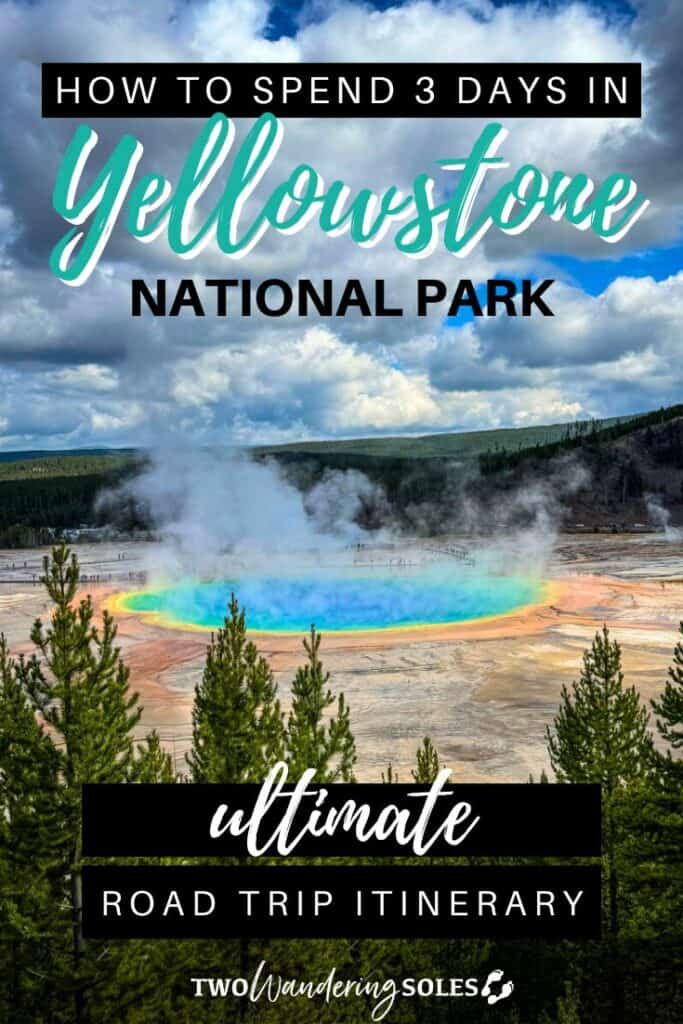
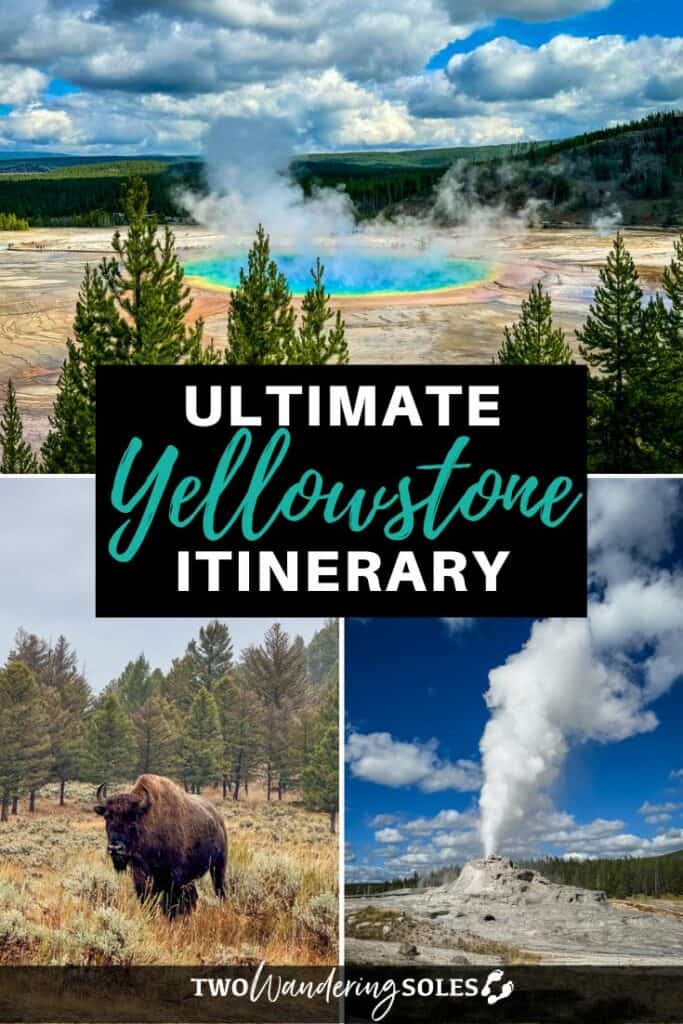
We want to hear from you!
What did you think of our 3 days in Yellowstone itinerary? Are you planning a trip to Yellowstone National Park and still have questions? Leave us a comment below and we’ll do our best to get back to you!
